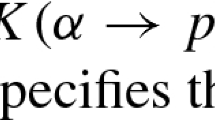Abstract
Truth’s universal knowability entails its discovery. This threatens antirealism, which is thought to require it. Fortunately, antirealism is not committed to it. Avoiding it requires adoption (and extension) of Dag Prawitz’s position in his long-term disagreement with Michael Dummett on the notion of provability involved in intuitionism’s identification of it with truth. Antirealism (intuitionism generalized) must accommodate a notion of lost-opportunity truth (a kind of recognition-transcendent truth), and even truth consisting in the presence of unperformable verifications. Dummett’s position cannot abide this, while Prawitz’s can. Antirealism’s epistemic notion of truth derives from general features of its meaning theory, not from a universal knowability principle.
Similar content being viewed by others
References
Bach K. (1998) “Ambiguity”, Routledge encyclopedia of philosophy. Routledge, London
Dummett, M. (1977/2000). Elements of intuitionism (2nd ed.). Oxford: Oxford University Press.
Dummett, M (1978a). The philosophical basis of intuitionistic logic. In Truth and other enigmas. London: Duckworth.
Dummett, M. (1978b). The reality of the past. In Truth and other enigmas. Cambridge, MA: Harvard University Press.
Dummett, M. (1978c). “Realism” [an address delivered in 1963]. In Truth and other enigmas. Cambridge, MA: Harvard University Press.
Dummett M. (1987) Reply to Dag Prawitz. In: Taylor B. (eds) Michael Dummett—contributions to philosophy. Martinus Nijhoff, Dordrecht
Dummett M. (1991) The logical basis of metaphysics. Harvard University Press, Cambridge, MA
Dummett, M. (1993a). What is a theory of meaning? (II). In The seas of language. Oxford: Oxford University Press.
Dummett, M. (1993b). Realism. In The seas of language. Oxford: Oxford University Press.
Dummett M. (2004) Truth and the past. Columbia University Press, New York
Hand M. (1993) More on pronouns of address and truth conditions: reply to Tsohatzidis. Linguistics 31: 749–751
Hand M. (2009) Performance and paradox. In: Salerno J. (eds) New essays on the knowability paradox. Oxford University Press, New York
Kaplan D. (1989) Demonstratives: An essay on the semantics, logic, metaphysics, and epistemology of demonstratives and other indexicals. In: Almog J., Perry J., Wettstein H. (eds) Themes from Kaplan. Oxford University Press, New York
Prawitz D. (1988) Knowability and constructivism. Philosophical Quarterly 38: 422–432
Prawitz D. (1998) Comments on the papers. Theoria 64: 287
Raatikainen P. (2004) Conceptions of truth in intuitionism. History and Philosophy of Logic 25: 131–145
Tsohatzidis S. (1992) Pronouns of address and truth conditions. Linguistics 30: 569–575
Tsohatzidis S. (1993) Less on pronouns and truth conditions: a response to Hand’s reply. Linguistics 31: 753–755
Wright, C. (1987). Anti-realism, timeless truth and Nineteen Eighty-Four. In Realism, meaning, and truth. Oxford: Basil Blackwell Ltd.
Wright, C. (2003). Truth as sort of epistemic: Putnam’s peregrinations. In Saving the differences. Cambridge, MA: Harvard University Press.
Zimmerman T. (1997) The addressing puzzle. In: Kunne W., Newen A., Anduschus M. (eds) Direct reference, indexicality, and propositional attitudes. CSLI Publications, Stanford
Author information
Authors and Affiliations
Corresponding author
Rights and permissions
About this article
Cite this article
Hand, M. Antirealism and universal knowability. Synthese 173, 25–39 (2010). https://doi.org/10.1007/s11229-009-9674-x
Received:
Accepted:
Published:
Issue Date:
DOI: https://doi.org/10.1007/s11229-009-9674-x



